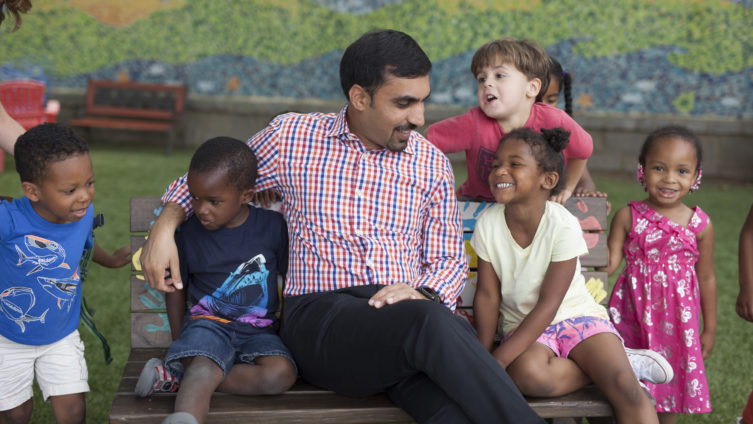
For several months now, on calls with other heads of schools from around the nation, we all wrestle with the same question: how many letters will we write – can or must we write – in response to the frequent tragedies that inflict our nation? It seems that just when we’ve barely caught our breath and absorbed one before another one strikes and our emotions, unsettled already, must again be rattled, not allowed to stand still even for one moment.
In less than 72 hours, we’ve witnessed two African Americans at a Kentucky Kroger store gunned down after a failed attempt by the shooter to enter and violate a black church; mail bombs sent to political leaders and actors and activists, the manhunt and arrest of the person responsible; and now the shooting and death of 11 individuals at a synagogue in the midst of Saturday morning prayers. Where are we safe anymore if not in our homes, places of worship and schools? Churches, temples, synagogues, schools, and outside homes or inside apartment buildings have all recently witnessed bigotry, prejudice, discrimination and death. Hate has infiltrated our precious communities where we preach love and togetherness, community and belonging. Suspicion of our fellow colleagues, neighbors and even friends, has shattered those communities and left us on edge, even if the assault is thousands of miles away from our front porch.
Over the last few weeks, I’ve found myself wondering about one question: what is the purpose of schools today? As head of school, this question is central to my work: the purpose of education and the purpose of a school overlap but they are not the same. All schools are organized around the same building blocks – students, teachers, subjects, schedules, the school day, celebrations and traditions, graduation, etc. But that’s what schools do, not who they are. The best schools lead with who they are, not what they do. The best schools build community; they share values celebrating and nurturing the building blocks of a healthy society: children and families. The best schools are places of refuge for our unsettled souls, offering stability and continuity when the world around us treats people as products, is chasing progress, running faster than our minds and hearts can keep up.
The irony of 21st-century society is that we’ve made better cars, better phones and computers, even better medicines but we are still struggling to make a better human and build healthier communities. We own better “stuff” and live longer lives but we are less happy, less fulfilled, and less accepting and tolerant of others. We may be using our brains more, connected our devices to billions of others, but we have disconnected our hearts in the process.
Instead of respectful dialogue and understanding, we have introduced division into our lives. Any difference between us has become something to fear again, to suspect and eliminate. The ubiquity of information has not led to greater empathy or understanding. Ironically, it has created echo chambers where one can safely cocoon themselves in the certainty of their thoughts, feelings and values, and even find others willing to support them and urge action. Rather than curiosity and healthy debate, we seek instant agreement, instant answers, instant affirmation.
Places like The Children’s School matter even more now; we need to accelerate, not temper, our work to build diverse communities committed to equity and inclusion. Our right to show up as our authentic self – to love, learn and worship as we are – depends on whether we can salvage our inner spirit and character and recognize that those who look, talk, love and worship differently from us love and value their children and families too.
Three weeks ago on a Tuesday morning, several staff members and I went to the Center for Civil and Human Rights. While in the MLK “Voice to the Voiceless” exhibit, I went into an inward space, searching for my own sense of stability in a world outside that seems committed to destroying it. One moment, early on the tour, brought me some peace and a renewed sense of purpose and dedication to what I do and who I am, what I still want to do and who I still want to be: Dr. King used to carry a note in his wallet at all times, a quote from Gandhi: “‘In the midst of death, life persists. In the midst of darkness, light persists.’ We are today in the midst of death and darkness. We can strengthen life and live by our personal actions by saying ‘no’ to violence and saying ‘yes’ to life.”
Today, Oct. 29 at noon, The Children’s School faculty, staff and students will all observe a moment of silence. I invite you too, wherever you are, to do the same, whether in prayer or reflection, by yourself or with others, for the victims and their families, friends and neighbors, for the community in Pittsburgh and others that share its faith and values, that share its purpose and character; I invite you in that moment of silence to say ‘no’ to violence and say ‘yes’ to life; I invite you then to commit to community first, building and affirming what makes us different and what we also share in common. Our connection to one another and happiness as fellow humans is dependent on celebrating Others, not denigrating them, because forming A More Perfect Union means first striving for it in our own diverse neighborhoods.
For the children who depend on us to be and do better,

Nishant N. Mehta
Head of School









